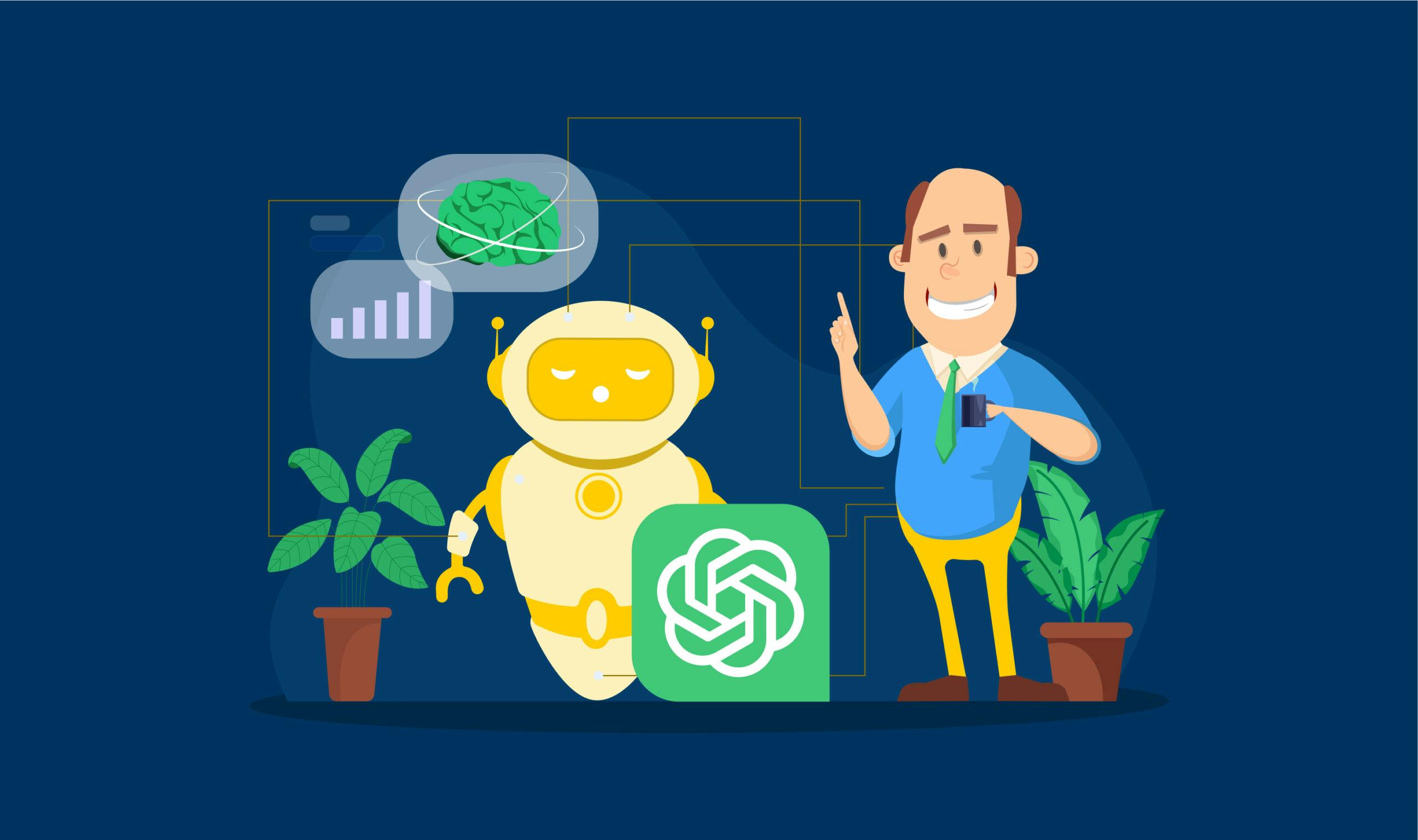
Artificial intelligence has emerged as a game-changer in the world of accounting, with a new breed of AI tools redefining how accountants approach their work. To stay competitive, embracing AI is no longer a choice, but a strategic necessity.
At the forefront of this revolution is ChatGPT, an AI language model developed by OpenAI. Earlier this year, ChatGPT became the fastest-growing application in history, smashing the 100-million-user milestone just a couple of months after its launch.
In this article, we’ll highlight how you can leverage ChatGPT to enhance accounting processes, optimize efficiency, and thrive in the modern accounting landscape.
What is ChatGPT?
ChatGPT is an AI tool designed to understand and generate text-based language in response to the input it receives. It combines natural language processing (NLP) and machine learning (ML) algorithms to engage in human-like conversations.
Unlike traditional chatbots, ChatGPT goes beyond pre-programmed responses and fixed scripts. It can learn from vast amounts of text data, adapt to a wide range of topics and contexts, and improve its performance over time. This allows ChatGPT to:
- Understand questions, prompts and statements from users
- Assume different roles and writing styles according to the prompts it receives
- Generate near-instant responses that are highly relevant
- Provide responses in the context of a broader ‘conversation’
ChatGPT’s ability to learn from data has given it a broad range of use cases. It’s still early days, but users are leveraging it for everything from basic research and ideation to language translation, content creation, and even coding assistance.
12 ways to use ChatGPT in accounting
ChatGPT’s ability to deliver highly relevant and complex responses in a matter of seconds makes it a powerful tool for accounting firms looking to streamline processes and save time. But it’s still early days.
Currently, only 5% of tax professionals have integrated ChatGPT or other generative AI software into their operations. But that looks set to change, with 6% of tax pros planning to use ChatGPT soon and another 26% considering it.
In this section, we’ll explore some potential accounting use cases.
1. Bookkeeping
Bookkeeping is an essential part of most accounting firms’ offerings, but without the help of tech, it involves a lot of repetitive processes and manual data entry. ChatGPT can help automate different parts of this process, including:
- Transforming data from e-receipts, invoices, and financial documents into spreadsheets or table format
- Categorizing and tagging expenses, income sources, and transactions
- Double-checking data for accuracy and completeness
Below is an example of how ChatGPT can help identify and categorize items on a client’s bank statement.
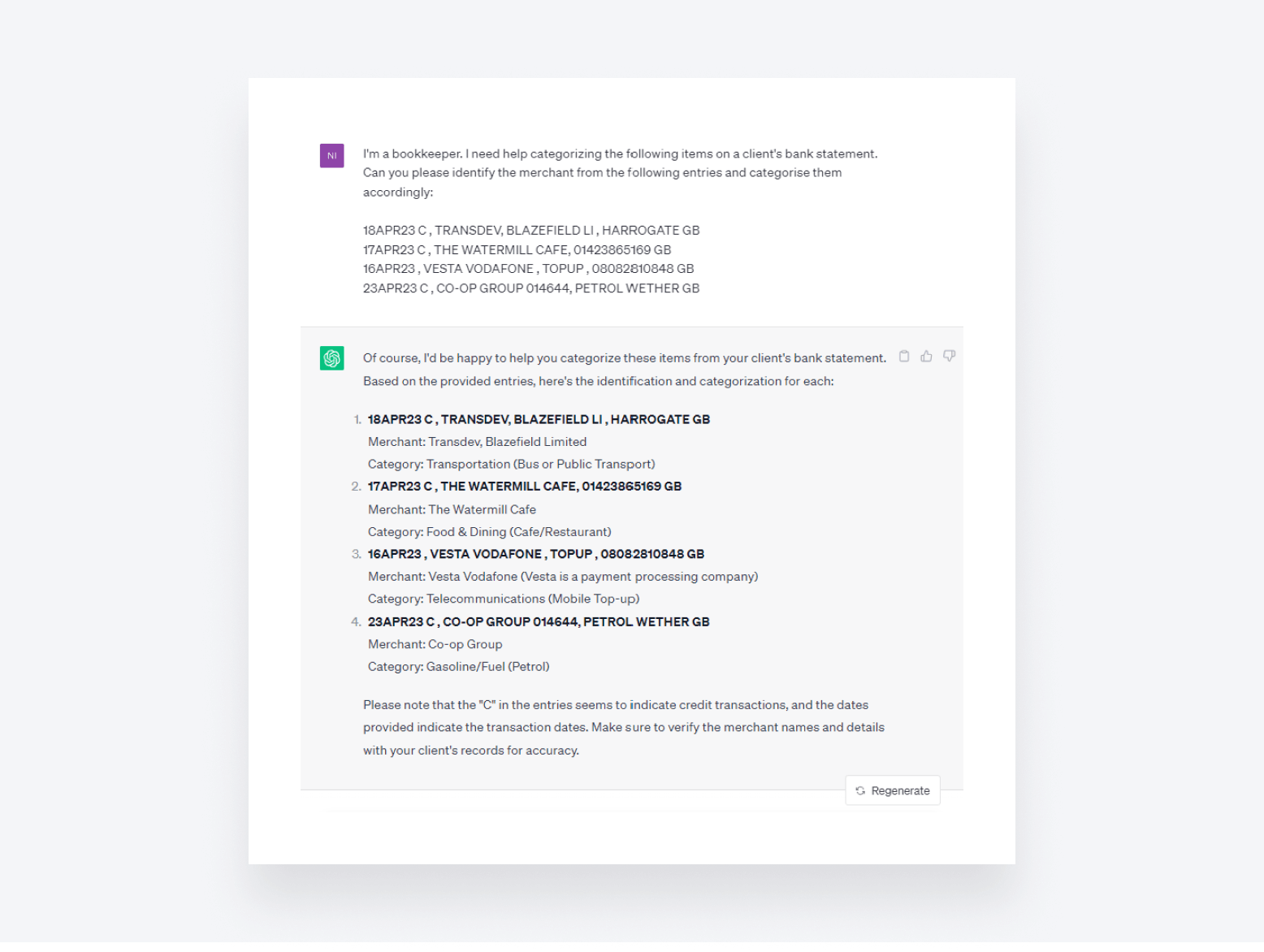
2. Tax return preparation
For most accounting firms, tax returns are the bread and butter of business. But when tax season comes, the challenge is always how to serve as many clients as possible with limited time and resources.
Any tool that can streamline the tax preparation process will be welcomed with open arms by most accountants, and ChatGPT has the potential to be a game-changer. Here are just some of the ways it can help with the tax preparation process:
- Clarifying tax terminology and concepts
- Creating tax preparation checklists to standardize the process
- Double-checking entries and calculations
- Drafting responses to IRS notices
- Guidance on tax deductions and credits
It’s worth noting that to gain access to real-time data, you’ll need to sign up for ChatGPT Plus, a paid version that now integrates with Microsoft’s search engine Bing. While this feature seems to be slated for the free version as well, for the time being, it only has access to data up to September 2021, making it unreliable when it comes to the latest IRS deductions or regulations.
In the video below, Marc Howard explains in detail how ChatGPT can help process tax returns.
3. Client communications and support
Keeping clients informed and in the loop is essential for any well-run accounting firm, but manually writing emails and answering questions can be a huge drain on resources.
You can claw most of that time back by prompting ChatGPT to draft your client emails for you. For example, you could ask it to create email templates, allowing you to streamline client communications at scale.
Let’s look at an example:
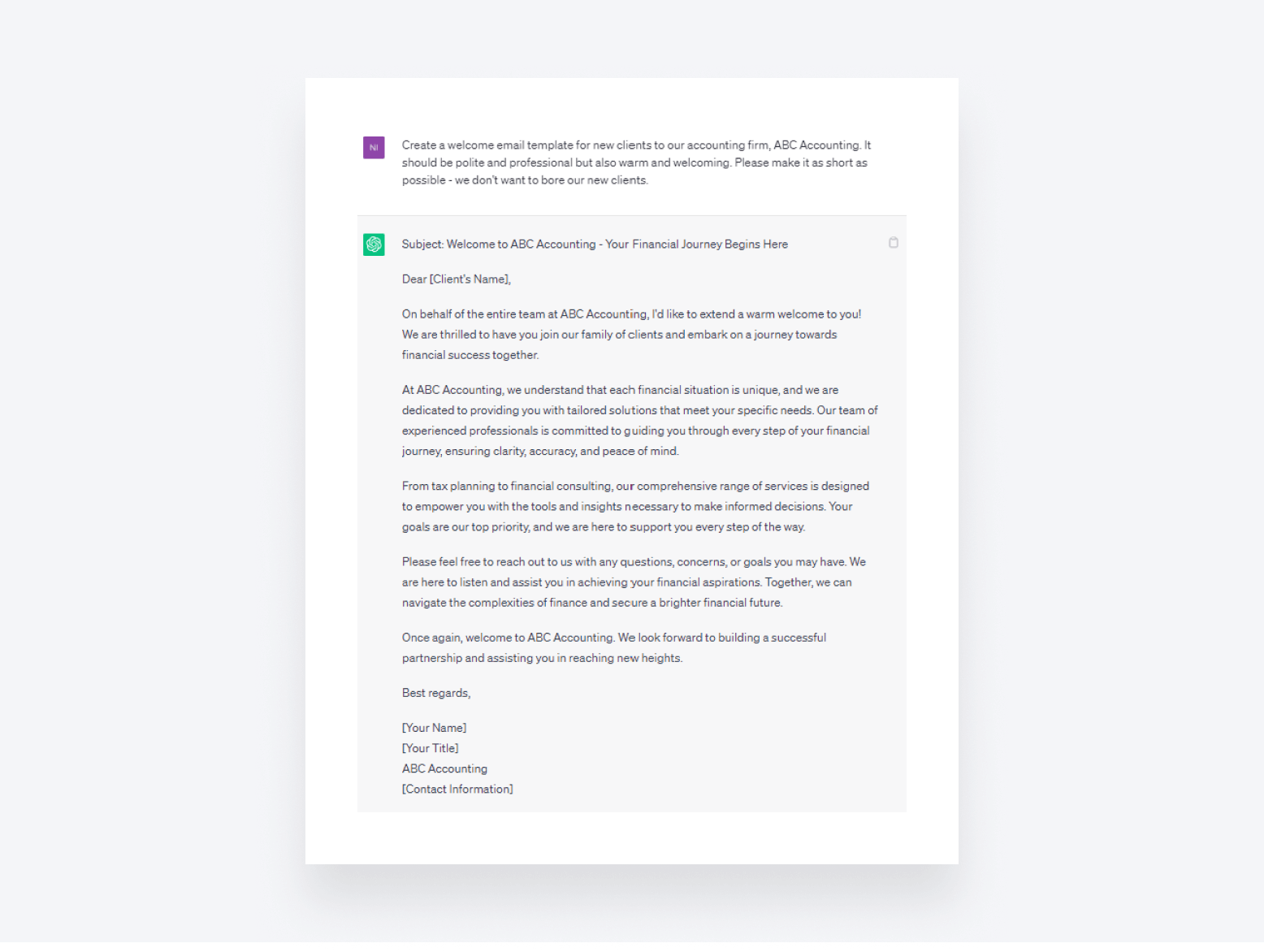
You can even build a ChatGPT-powered chatbot, using the ChatGPT API key. This way, you can engage visitors as they land on your website, answer their questions, and generate leads — all without you lifting a finger. Not bad, eh?
4. Financial reporting templates
Creating accurate and timely financial reports is an essential part of an accounting firm’s work. Without a way to automate and streamline this process, it can be needlessly time-consuming and fiddly. Once again, ChatGPT can help.
With the right prompts, ChatGPT can generate templates for financial reports, including balance sheets, income statements, and cash flow statements. Let’s take a look at an example:
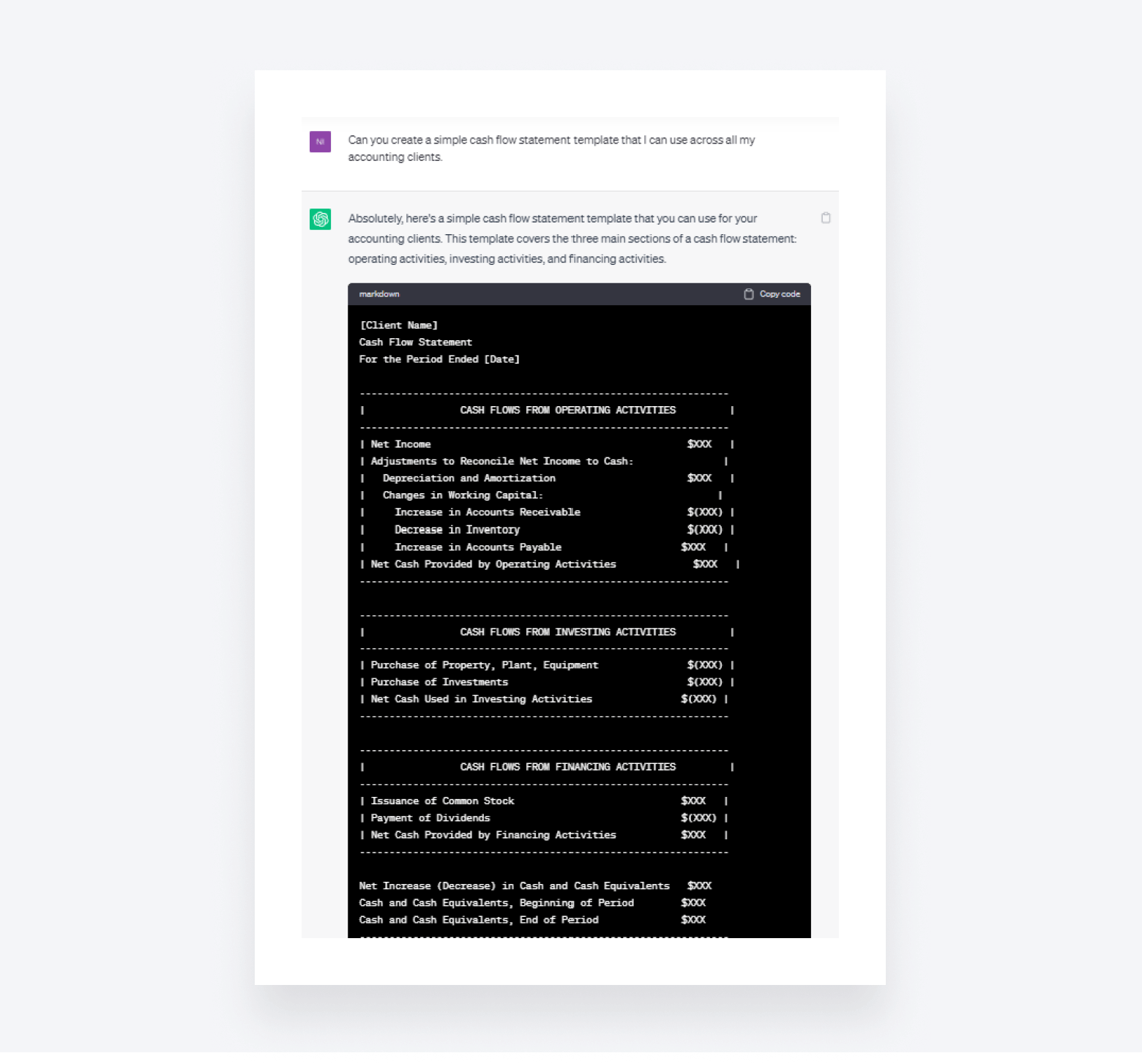
5. Data entry and formatting
What if you need to upload a client’s recent transactions to your accounting system, but all you have is a bunch of PDF bank statements? No problem, ChatGPT can help.
By copying and pasting the transaction data (with names and addresses removed, for security’s sake!) from the PDF to ChatGPT, you can then prompt the AI to transform the data into CSV format, for example. Then you just stick it in a spreadsheet, upload it to your accounting software, and away you go.
This process is explained in more detail in this video by popular accounting influencer Jason Staats.
6. Content creation
Content marketing is important for every business with an online presence, and accounting firms are no different. But smaller firms in particular may struggle to find the time and money to create outstanding content on a regular basis.
Enter ChatGPT. With some well-written prompts, you can get instant social media posts, blog articles, and even web copy. You may need to tweak them to your liking, but leveraging ChatGPT here could save you countless hours while delivering excellent results. Here’s an example:
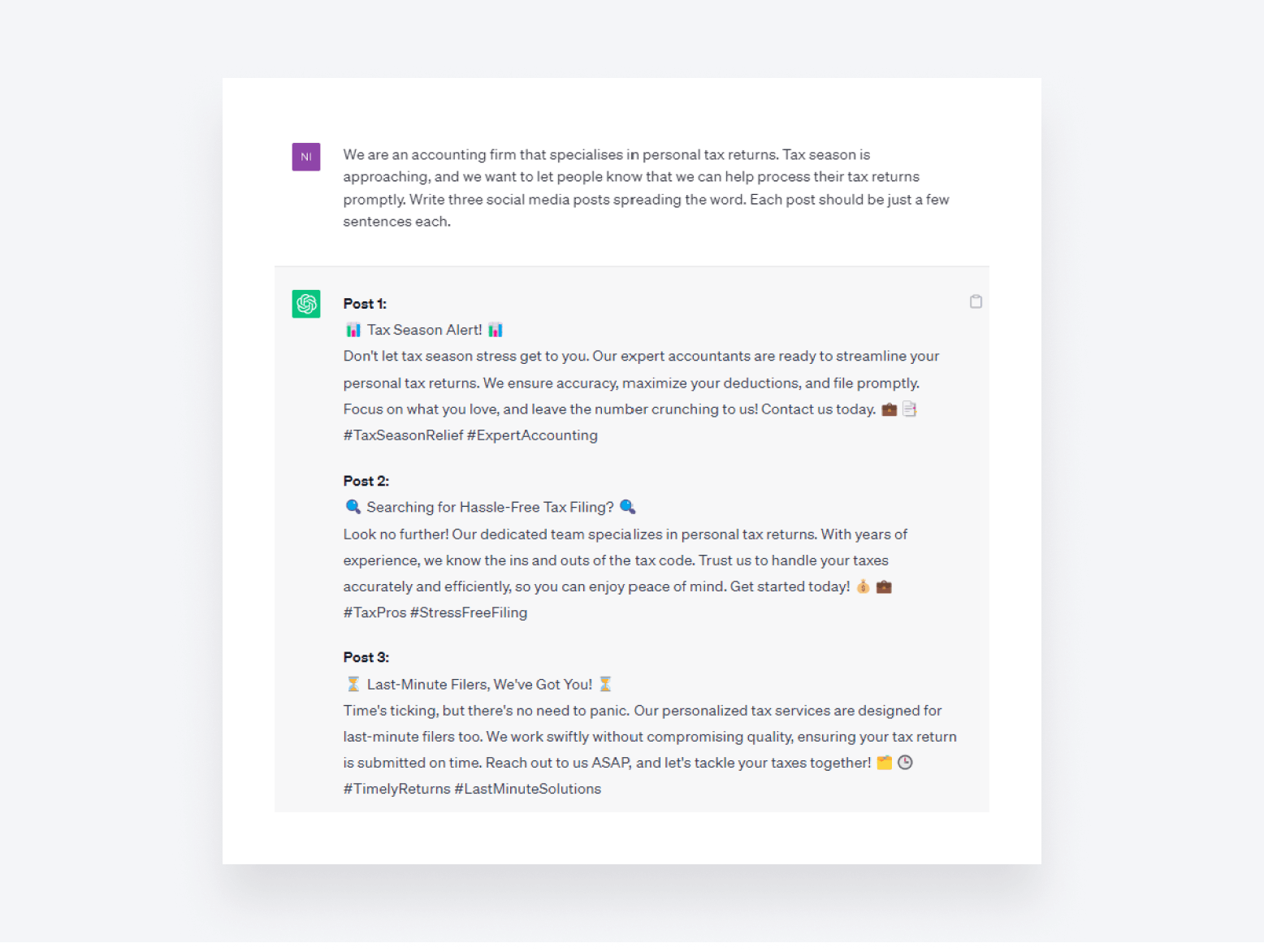
7. Question-answering service
Before ChatGPT, Google was most people’s go-to tool for getting answers to questions. But using Google usually involved trawling through the search engine’s results to find the specific information you needed.
With ChatGPT, you get the exact information you need straight away. And unlike Google, how that information is delivered to you depends on how you write your prompt. For example, using the following prompts, ChatGPT would describe forensic accounting in entirely different ways:
- Describe forensic accounting in detail
- Describe forensic accounting in just a few sentences
- Describe forensic accounting to me like I’m a ten-year-old child
Let’s take a look at one of the answers below. While this response would be of little use to an experienced accountant, it goes to show just how much your prompts can shape ChatGPT’s responses.
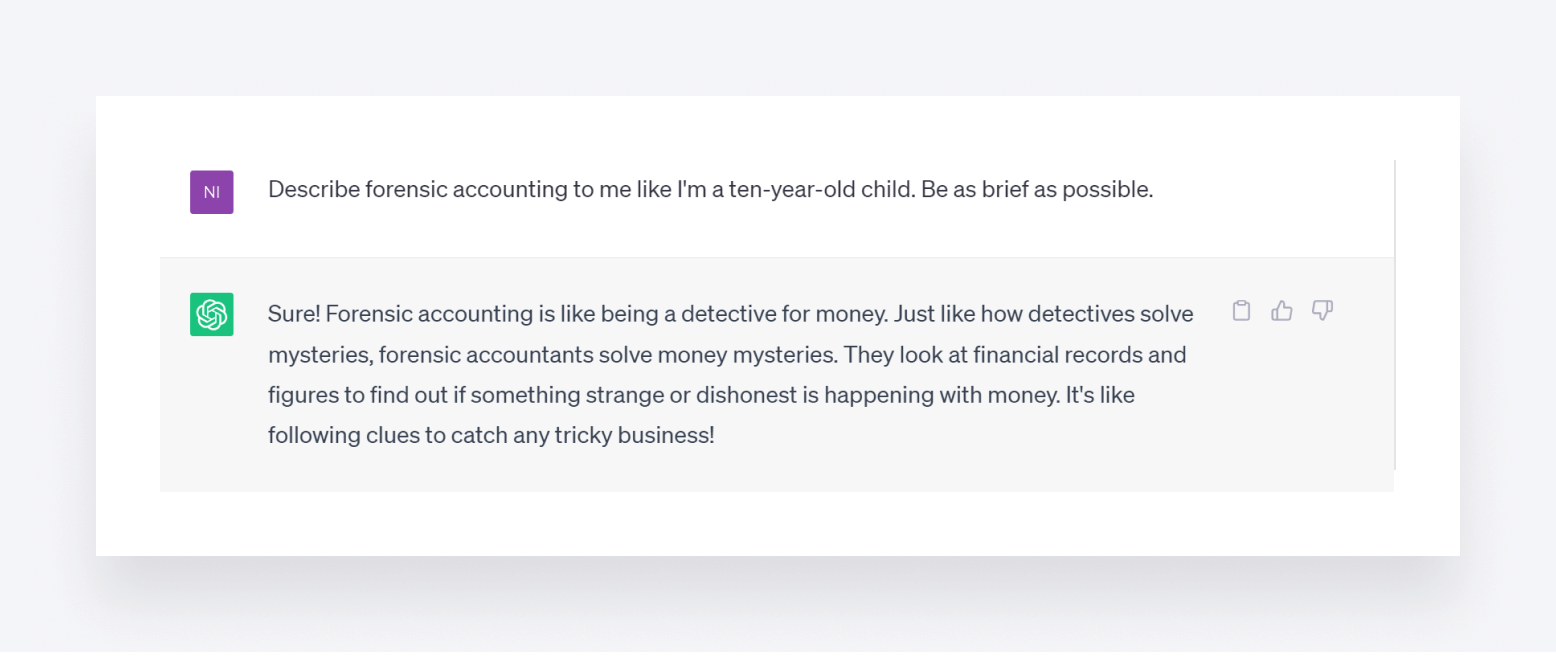
This makes ChatGPT a highly flexible and malleable tool that’s able to answer questions in a way that suits your specific needs.
8. Marketing strategy
ChatGPT isn’t just useful for creating individual pieces of content. You can use it to create your entire marketing strategy.
For bigger firms with in-house marketing teams, it can be used to augment human marketers and speed up processes. But for smaller firms with little budget for marketing, it can take the reins completely.
Below you’ll find an example of a ChatGPT-generated marketing strategy. Each of the steps outlined in this example (and there were many more steps beyond these, by the way) can be further automated or enhanced using ChatGPT as well.
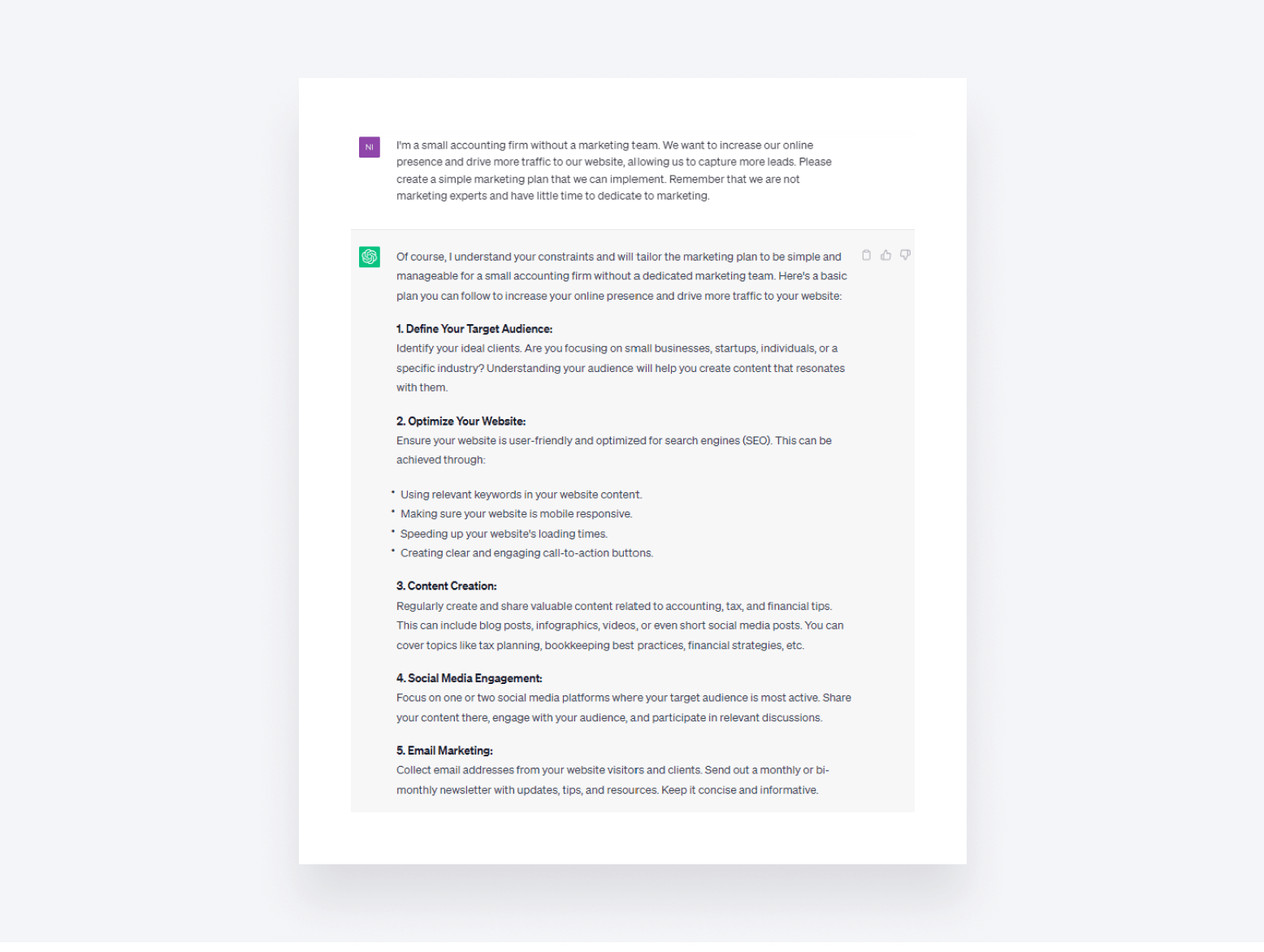
9. Learning and training
ChatGPT is also an excellent learning resource, especially for accounting students or junior accountants that are still learning their trade. Think of it as a virtual tutor, there to answer your questions, create learning materials, and test accountants’ knowledge. The possibilities are endless.
That said, ChatGPT might not yet be clued in when it comes to the latest tax or accounting standards, nor the nuances of the industry and its processes. But when it comes to general topics, it has all the answers you need.
Here’s an example of how you can use ChatGPT to test your accounting knowledge:
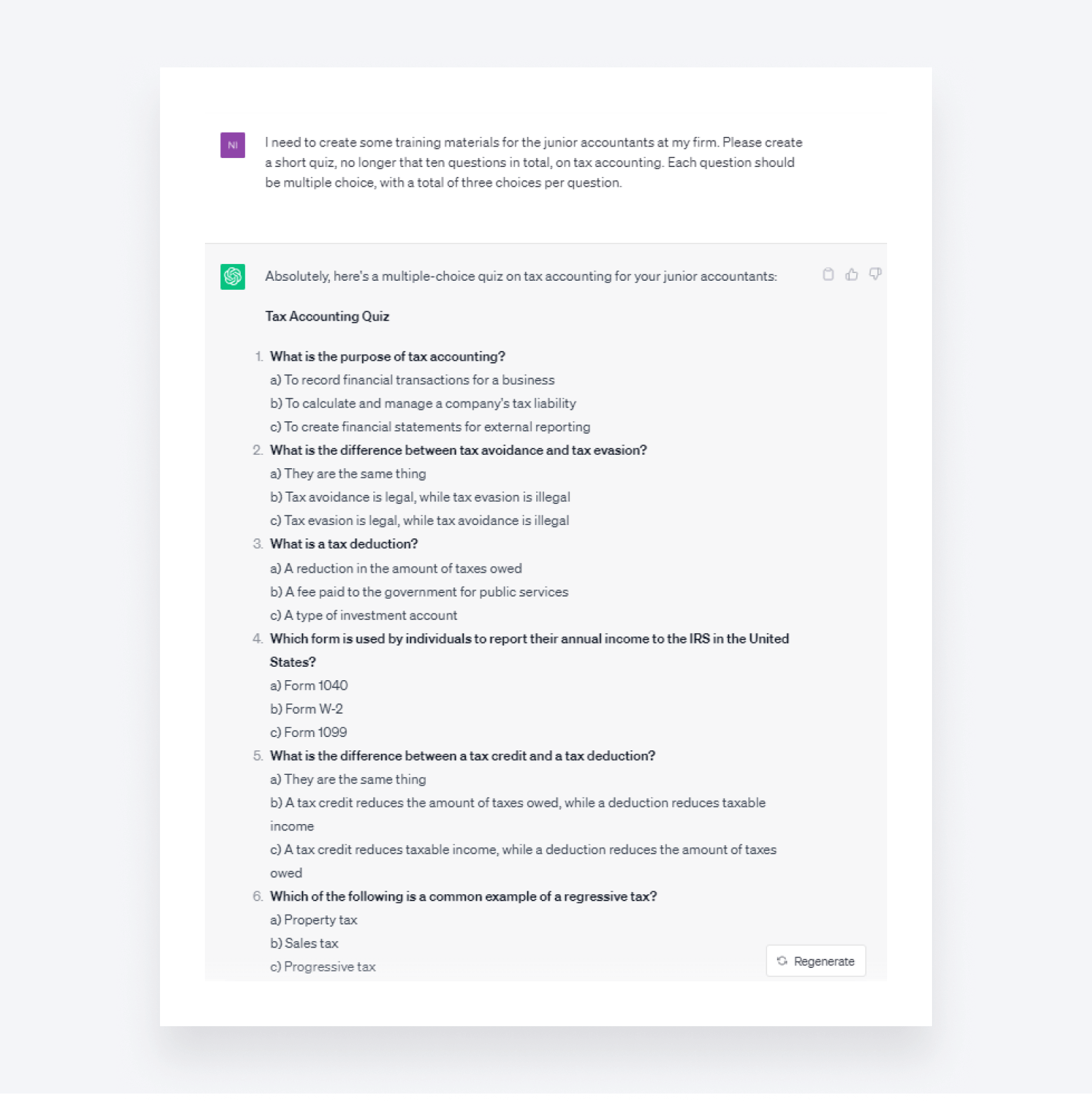
10. Fraud detection and risk assessment
Fraud detection is an incredibly complicated job to perform manually. Spotting discrepancies and anomalies amid vast amounts of accounting data is like finding a needle in a haystack. But with a tool like ChatGPT, the potential to simplify this process is huge.
While most accounting and audit firms are yet to embrace ChatGPT for this particular use case, investment banking behemoth JPMorgan is currently developing a proprietary generative AI to detect fraud. This just goes to show the potential that a tool like ChatGPT could have in the field of fraud detection.
11. Create checklists
Accounting is all about processes. But to ensure accuracy and consistency across all clients, those processes must be standardized. Checklists are a great way to do this. They highlight the key steps to take in any given situation, ensuring that every accountant in your firm performs the process in the same way.
ChatGPT can easily create all manner of process checklists in the blink of an eye. You may need to adjust them to your liking, but using ChatGPT in this case will save you tons of time. Here’s an example:
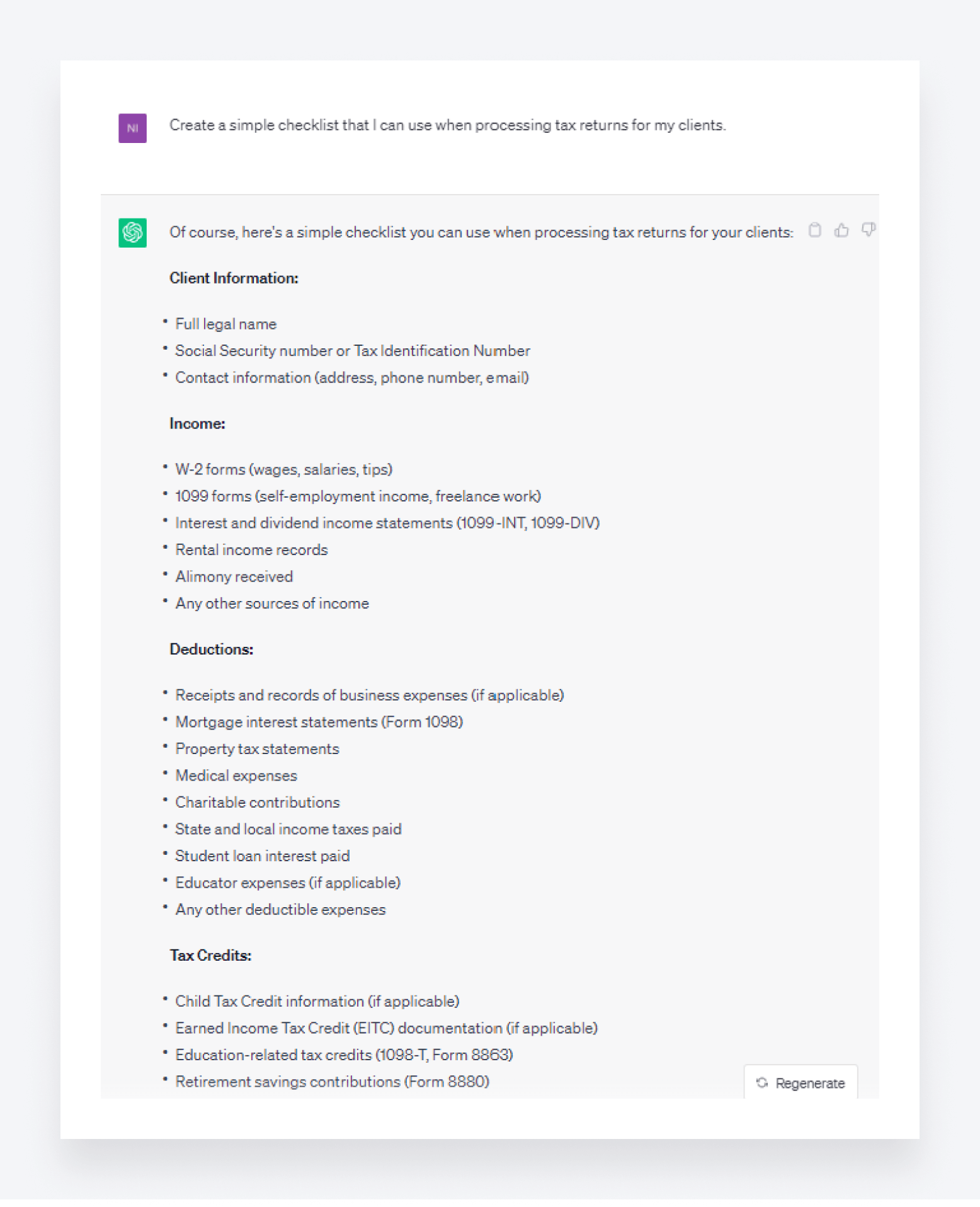
12. Client invoicing
Every accountant wants to get paid on time and in full. While there are tons of options when it comes to creating and sending invoices, none of the traditional software platforms allow you to create invoices using conversational prompts.
Using ChatGPT plugins — tools designed to help ChatGPT access third-party services and up-to-date data — you can easily create invoices. All you have to do is input the client details, your details, and the amounts to be paid, and ChatGPT does the rest.
What’s more, if something needs adjusting, there’s no need to manually edit the details yourself. You simply ask ChatGPT to do it for you.
You can find out more about this process in the video below:
Future outlook: the evolution of ChatGPT in accounting
In the world of AI, nothing stands still for long. The technology and models that power AI tools are constantly being refined and improved, leading to broader use cases, enhanced performance, and greater accuracy.
So what does the future hold for ChatGPT in accounting? Here are some key trends to look out for:
- A deeper understanding of financial concepts: Future versions of ChatGPT will likely have a broader and deeper understanding of complex accounting concepts, allowing it to provide more nuanced and personalized advice
- Enhanced data analysis: ChatGPT’s ability to analyze financial data will improve, enabling it to provide accurate trend analysis, variance explanations, and predictive analytics
- Deeper integration with accounting software: In the future, most accounting software will offer ChatGPT integration, allowing users to tap into its automation capabilities via their accounting system
- Natural language interfaces for accounting software: ChatGPT could even be embedded within accounting software, allowing users to interact with it using natural language rather than complex commands
- Real-time data integration: Future versions of ChatGPT will likely be able to integrate with real-time financial data sources such as banks, stock markets, and currency exchanges, enabling it to provide more up-to-date financial analysis
Advancements like these could lead to an explosion in adoption in the accounting industry, as ChatGPT goes from an intriguing novelty to an essential part of a modern accountant’s tech stack.
Conclusion
Among a host of AI-powered tools now being used in everyday work, ChatGPT is a true pioneer. Its flexibility makes it an ideal tool for accountants looking to automate and streamline a broad range of processes. The accounting industry has only begun scratching the surface of ChatGPT’s potential, but the coming years could see it have a transformative impact.
We’ve highlighted some of the processes that ChatGPT can automate in this article. But when it comes to understanding its potential, first-hand experience is best. So have a play around with it, get a feel for how it works, and see for yourself the time it could save you.

Thank you! The eBook has been sent to your email. Enjoy your copy.
There was an error processing your request. Please try again later.
Looking to boost your firm's profitability and efficiency?
Download our eBook to get the answers



